- Home
- P. D. James
The Lighthouse Page 24
The Lighthouse Read online
Page 24
Dalgliesh said, “In a case like this we need to know as much as possible about the person who has died. I’m told Mr. Oliver came here regularly, every three months throughout the year. I expect you got to know him.”
“Not really. We aren’t encouraged to talk to the visitors unless it’s what they want. It’s nothing to do with not being friendly or us being staff. Nothing snobbish like that. Mr. Maycroft and Dr. Staveley hardly see them either. They’re here for silence and solitude and security. They come here to be alone. Mind you, we had a prime minister here for two weeks. A lot of fuss that was over security, but he did leave his protection officers behind him. He had to or he wouldn’t have been allowed to come. He spent a lot of time sitting at that table just watching me work. Didn’t chat much. I suppose he found it restful. Once I said, ‘If you’ve nothing better to do, sir, you might as well whisk those eggs.’ He did.”
Dalgliesh would have liked to ask which prime minister and from which country, but knew that the question would have been crass and that he wouldn’t get an answer. He said, “If visitors spend their time alone, what about meals? When are they fed?”
“The cottages all have a fridge and a microwave. Well, you’ll have seen that for yourself. The guests see to their own breakfast and midday meal. Dan Padgett drives the van, and he delivers what they need for breakfast and lunch the night before. They get eggs fresh from our own hens, bread I bake myself and bacon. We’ve a butcher on the mainland who cures his own—none of that milky fluid that seeps out of packet bacon. For lunch they mostly get salad, or roast vegetables in winter, and a pie or cold meats. Then there’s dinner here at eight o’clock for anyone who wants it. Always three courses.”
Kate said, “Mr. Oliver was at dinner on Friday. Was that usual?”
“No, it wasn’t. He’s only done that about three times before in all the years he’s been coming here. He liked to eat in his cottage. Miss Oliver did the cooking for him, and she’d give me orders the day before.”
Dalgliesh said, “Did he seem his usual self at dinner? It was probably the last time he was seen alive except by his family. Anything unusual that happened might give us a pointer to his mental state.”
She had turned her face away from him towards the stove, but not quickly enough. He thought he detected the quick look of relief. She said, “I wouldn’t say he was behaving—well, what you might call normally, but I don’t know what was normal for him. As I’ve said, we don’t usually get to know the visitors. But it’s usual for people to be fairly quiet at dinner. It’s understood they don’t talk about their work or why they’re here. And you don’t expect raised voices. Dr. Staveley and Mr. Maycroft were there, so you’d do better asking them.”
Kate said, “Of course. But now we’re asking for your impression.”
“Well, I wasn’t in the dining room for much of the time, I never am. We began with melon balls with orange sauce, and I’d arranged that on the plates before I banged the dinner gong, so I wasn’t in the room until Millie and I went in with the guinea fowl and the vegetables and to take away the first-course plates. I could see that Dr. Yelland and Mr. Oliver were beginning to argue. I think it was something to do with Dr. Yelland’s laboratory. The other three looked embarrassed.”
Kate asked, “Mr. Maycroft, and Dr. and Mrs. Staveley?”
“That’s right, just the three. Miss Holcombe and Mrs. Burbridge don’t usually take dinner in the house. I expect Dr. Yelland will tell you about it himself. Do you think it showed that Mr. Oliver wasn’t himself on Friday, that something else had upset him?”
Dalgliesh said, “It certainly seems possible.”
“Come to think of it, I suppose I do get to know some of the visitors better than most, seeing that I wait at dinner. Better than Dr. Staveley and Mr. Maycroft, if truth be told. Not that I could give you their names, and I wouldn’t if I could. There was a gentleman—I think they called him a captain of industry—he liked his bread and dripping. If we had roast beef—we did more often then, especially in winter—he’d whisper to me before he left the dining room, ‘Mrs. P, I’ll be round to the kitchen just before bed.’ I would’ve done my cleaning up before that and be having a quiet cup of tea before the fire. He loved his bread and dripping. He told me that he’d had it as a boy. He talked a lot about the cook his family had. You never forget the people who were kind to you in childhood, do you, sir?”
“No,” said Dalgliesh. “You never do.”
Kate said, “It’s a pity, Mrs. Plunkett, that Mr. Oliver wasn’t as friendly and confiding. We were hoping you’d be able to tell us something about him, help us to understand why he died as he did.”
“Truth to say, I hardly set eyes on him. Can’t imagine him coming into my kitchen for a chat and bread and dripping.”
Kate asked, “How did he get on with other people on the island? I mean, staff and the permanent residents.”
“As I say, I hardly set eyes on him, and I don’t suppose the staff did much. I did hear a rumour that he was planning to move here permanently. I expect Mr. Maycroft will have told you about that. It wouldn’t have been popular with the staff, and I don’t expect Miss Holcombe would have been any too pleased. Of course, we all knew he couldn’t get on with Dan Padgett. Not that he saw him all that often, but Dan takes the meals round and does any odd jobs that need doing in the cottages, so I suppose they came into contact more than most of the people here. Dan couldn’t do anything right as far as Mr. Oliver was concerned. He or Miss Oliver would ring me with complaints that Dan hadn’t delivered what they’d ordered or that it wasn’t fresh enough—which couldn’t be true. No food goes out of this kitchen that isn’t fresh. Seems like Mr. Oliver had to pick a quarrel with someone, and I suppose Dan was the easiest person.”
Kate said, “And then there was trouble about the blood sample lost overboard.”
“Yes, I did hear about that. Well, of course Mr. Oliver had a right to be annoyed. It meant he had to give another sample, and no one enjoys having a needle stuck in them. Not that he did give another sample, as it turned out. Still, he probably had it hanging over him. And it was careless of Dan, no denying.”
Kate said, “You don’t think he could have done it on purpose to get his own back on Mr. Oliver for picking on him?”
“No, I can’t see that. I’d say he was too frightened of Mr. Oliver to do something daft like that. Still, it was an odd accident. Dan didn’t like the sea, so why hang over the edge of the boat? More likely he’d be sitting in the cabin, I’d have thought. That’s where he sat the odd times I’ve been in the launch with him. Proper scared, he was.”
Kate asked, “Did he ever talk to you about how he came to be here—Dan Padgett, I mean?”
Mrs. Plunkett seemed to be considering how and whether to reply. Then she said, “Well, you’ll be asking him, I daresay, and no doubt he’ll tell you.”
Dalgliesh said, “I expect he will, Mrs. Plunkett, but it’s always useful to get two opinions about people when we’re investigating a suspicious death.”
“But Mr. Oliver committed suicide. I mean, he was found hanging. I don’t see that it’s anything to do with anyone except him and maybe his daughter.”
“Perhaps not, but his state of mind must have been influenced by other people, what they said, what they did. And we can’t be certain yet that it was suicide.”
“You mean it could’ve been murder?”
“It could have been, Mrs. Plunkett.”
“And if it was, you can put Dan Padgett out of mind. That boy hasn’t got the guts to kill a chicken—not that he’s a boy, of course. He could be nearing thirty now, for all he looks young. But I always think of him as a boy.”
Kate said, “We were wondering if he ever confided in you, Mrs. Plunkett. Most of us need to talk to someone about our lives, our problems. I get the impression that Dan wasn’t really at home on Combe.”
“Well, that’s true enough, he wasn’t. It was his mother who was dead keen on coming here. H
e told me that his mum and her parents used to stay in Pentworthy for two weeks every August when she was a child. Of course, you couldn’t visit the island even then, but she longed to see it. It became a kind of romantic dream for her. When she got so ill and knew she was dying, she longed to come here. Maybe she’d come to believe that the island could cure her. Dan didn’t like to refuse, seeing how ill she was. They were both very wrong not telling Mr. Maycroft that she was so ill when they applied for the jobs. It wasn’t fair on him—or on any of us, come to that. Mrs. Staveley was in London, but she came back towards the end and took over the nursing. Mr. Boyde was there a bit too, but I suppose that was because he used to be a clergyman. Most of us women helped with the nursing, and Dan didn’t do much of his own work during that last month. I think he resented his mother at the end. I was in the cottage cleaning up after Mrs. Padgett had died. Mrs. Staveley had laid her out, and she was on the bed waiting to be taken down to the harbour. Dan said that he’d like a lock of hair, so I went to find an envelope for him to put it in. He fairly tugged it out, and I could see the look on his face, which wasn’t really what you’d call loving.
“I think he resented both his parents, which is sad really. He told me they should’ve been quite well off. His dad had a small business—printing, I think he said—which he had inherited from his own father. But he wasn’t much of a businessman. He took on a partner who cheated him, so the business went bankrupt. And then he got cancer—just like Dan’s mother, only his was in the lungs—and died, and they found he hadn’t even bothered to insure himself. Dan was only three, so he doesn’t really remember his dad. So Dan and his mother went to live with her older sister and her husband. They had no children of their own, so you’d think they might have taken to the boy, but they never did. They belonged to one of those puritanical sects which think everything you enjoy is a sin. They even made him change his name. He was christened Wayne; Daniel is actually his second name. He had a horrible childhood, and nothing seemed to go right for him after that. His uncle did teach him carpentry and decorating—he’s really very good with his hands, is Dan. Still, he never was an islander and never will be. Of course, he didn’t tell me all this about his childhood at once. It came out bit by bit over the months. It’s like you said, we all need someone to talk to.”
Dalgliesh said, “But now that his mother is dead, why does he stay?”
“Oh, he’s not going to. His mother’s left him a bit of money she saved, and he plans to go to London and take some kind of training. I think he’s applied for a degree course at one of the new universities there. He can’t wait to get away. To tell you the truth, I don’t think our previous secretary would have taken him on. But Mr. Maycroft was new and he did have two vacancies, one for a general handyman and the other to give Mrs. Burbridge a bit of help. He’ll have another vacancy when Dan leaves—that’s if the island carries on.”
“Has there been any talk that it might not?”
“Well, a bit. Suicide does put people off, doesn’t it? Murder too, of course. But you don’t murder people just because they’re irritating occasionally. Anyway, Mr. Oliver only ever stayed two weeks, so he’d have been gone in less than a fortnight. And if he was murdered, someone must’ve got on the island unseen, which we’ve always thought wasn’t possible. And how did he get off again? I suppose he could be still here, hidden somewhere. Not a nice thought, is it?”
“And there’s Millie. Mr. Maycroft appointed her too, didn’t he?”
“Yes, he did, but I can’t see that he had much choice. Jago Tamlyn found her begging on the streets of Pentworthy and took pity on the girl. He’s got a soft heart, has Jago, especially for the young. He had a sister and she hanged herself after she was seduced and made pregnant by a married man. That was six years or so ago, but I don’t think he’s ever got over it. Maybe Millie looked a bit like her. So he rang Mr. Maycroft and asked if he could bring her to the island and find a room and a job for her until he could settle what best to do. It was either that or the police. So Mr. Maycroft found a job for her as assistant to Mrs. Burbridge with the linen and to help me in the kitchen. There’s not much wrong with Millie. She’s a good little worker when the mood takes her and I’ve no complaints. Still, the island’s not really a suitable place for a young girl. She needs her own kind and a proper job. Millie does more in the sewing line than she does for me, and I know Mrs. Burbridge worries about her. Not that it isn’t nice to have a bit of young life on Combe.”
Kate asked bluntly, “How do you get on with Miranda Oliver, Mrs. Plunkett? Is she as difficult as her father?”
“I’ll not say she’s an easy woman. More likely to give criticism than thanks. Still, she hasn’t had an easy life, poor girl, tied to an ageing father, always at his beck and call. Mrs. Burbridge tells me that she’s engaged to that secretary who worked for her father. Dennis Tremlett. You’ll have met him, of course. If that’s what she wants, I’m sure I hope they’ll be happy. There’ll be no shortage of money, I suppose, and that always helps.”
Kate said: “Did the engagement surprise you?”
“I never heard about it until this morning. I didn’t see enough of either of them to have an opinion one way or the other. As I said, we’re supposed to leave the visitors in peace, and that’s what I do. If they care to come into the kitchen, that’s another matter, but I don’t go looking for them. I haven’t the time anyway. I wouldn’t get much done if people were always in and out of the kitchen.”
It was said easily, with no apparent intention of conveying a hint, but Kate glanced at Dalgliesh. He nodded. It was an appropriate time to leave.
Kate had things to do. She left to join Benton, and Dalgliesh walked back to Seal Cottage to await the call from Dr. Glenister. Mrs. Plunkett had been more informative than she, perhaps, had realised. It was the first he had heard of Oliver’s proposal to move to Combe permanently. The other permanent residents would be more likely to see this as a disaster than an inconvenience, particularly Emily Holcombe. And there was something else. He was irked by a nagging conviction that, somewhere enmeshed in Mrs. Plunkett’s domestic chat, she had told him something of crucial importance. The thought lay like an irritating thread of cotton in his mind; if he could only grasp the end it would unravel and lead him to the truth. Mentally he reviewed their conversation: Dan Padgett’s deprived childhood, Millie begging on the streets of Pentworthy, the captain of industry and his bread and dripping, Oliver’s quarrel with Mark Yelland. The thread lay in none of these. He decided to put the problem firmly out of his mind for the present in the hope that, sooner or later, his mind would become clearer.
At midday precisely the telephone rang. Dr. Glenister’s voice came over strong, calm, authoritative and as unhesitatingly as if she were reading from a script. “Nathan Oliver died of asphyxiation caused by manual strangulation. The internal damage is considerable. The full autopsy report isn’t yet typed, but I’ll let you have it by e-mail when it is. Some of the internal organs are being analysed, but there’s little else of importance. Physically he was in pretty good shape for a sixty-eight-year-old. There’s evidence of extensive arthritis in the right hand, which must have caused some inconvenience if he wrote by hand—which from the evidence of a slight callus on the forefinger he did. The cartilages were calcified, as is not uncommon with the elderly, and there was a fracture of the superior cornu of the thyroid. This localised fracture is invariably caused by local pressure where a sharp grip has been applied. In this case great violence wouldn’t have been necessary. Oliver was frailer than he looked, and his neck, as you saw, was comparatively narrow. There is also a small bruise at the back of the neck where his head was forced back against something hard. Given the findings, there is no possibility that he bruised his own neck in an attempt to make suicide look like murder, if that fanciful possibility has been put forward. Oliver’s clothes are with the lab, but as you’ll know, with strangulation of this kind, where the head is driven back against a hard object, ther
e may be no physical contact between the assailant and the victim. But that’s your concern, not mine. One fact is interesting, though: I had to phone the lab this morning about a different case and they’d had a preliminary look at the rope. They won’t get anything useful there, I’m afraid. An attempt had been made to wipe the rope clean along its whole length. They might get some evidence of the material used to clean it, but it’s unlikely on that surface.”
Dalgliesh said, “Including the knot?”
“Apparently. They’ll e-mail you when they’ve got anything to report, but I said I’d tell you about the rope. Ring me if there’s anything else I can help with. Goodbye, Commander.”
“Goodbye, and thank you.”
The receiver was replaced. Dr. Glenister had done her job; she had no intention of wasting her time by discussing his.
Dalgliesh summoned Kate and Benton back to Seal Cottage and gave them the news.
Kate said, “So we’re unlikely to get anything useful from the rope except that Calcraft must have thought that the lab could raise fingerprints from the surface, so he isn’t ignorant of forensics. He might even have known that sweat can provide DNA. Jago and Padgett both handled the rope after the body was taken down, so would they have needed to wipe it clean? After the rope was replaced in the unlocked lighthouse, anyone could’ve had access to it.”
Benton said, “It could have been wiped, not by the killer, but by someone who was trying to protect him.”
When they had settled round the table, Dalgliesh set out the programme for the rest of the day. There were distances to be measured, the possibility of Padgett from Puffin Cottage seeing Oliver walking to the lighthouse and the time it would have taken him to get to the lighthouse on the lower cliff to be checked, the whole of the lighthouse to be meticulously examined for possible clues and the suspects individually questioned. It was always possible that after a night’s reflection something new would be learned.

 The Skull Beneath the Skin
The Skull Beneath the Skin A Taste for Death
A Taste for Death The Children of Men
The Children of Men The Part-Time Job
The Part-Time Job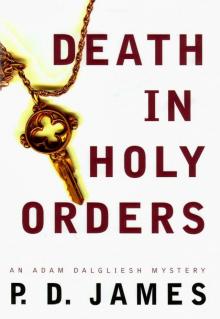 Death in Holy Orders
Death in Holy Orders The Victim
The Victim Shroud for a Nightingale
Shroud for a Nightingale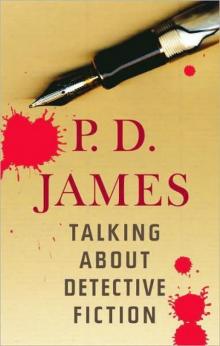 Talking about Detective Fiction
Talking about Detective Fiction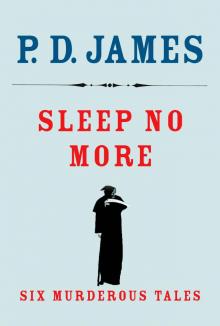 Sleep No More
Sleep No More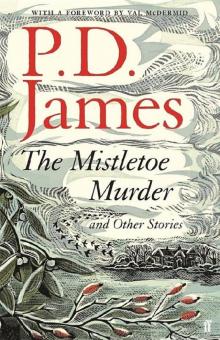 The Mistletoe Murder and Other Stories
The Mistletoe Murder and Other Stories Time to Be in Earnest
Time to Be in Earnest Original Sin
Original Sin A Mind to Murder
A Mind to Murder Cover Her Face
Cover Her Face Innocent Blood
Innocent Blood Devices and Desires
Devices and Desires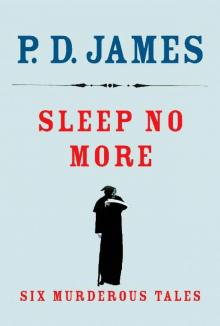 Sleep No More: Six Murderous Tales
Sleep No More: Six Murderous Tales Death Comes to Pemberley
Death Comes to Pemberley The Mistletoe Murder
The Mistletoe Murder Death of an Expert Witness
Death of an Expert Witness The Private Patient
The Private Patient The Black Tower
The Black Tower Devices & Desires - Dalgleish 08
Devices & Desires - Dalgleish 08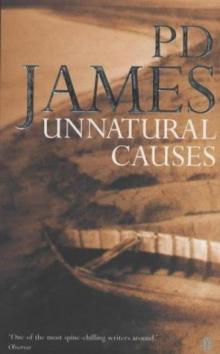 Unnatural Causes
Unnatural Causes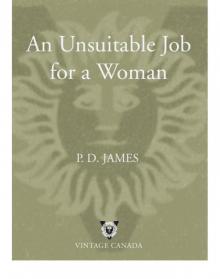 An Unsuitable Job for a Woman
An Unsuitable Job for a Woman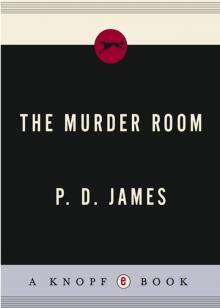 The Murder Room
The Murder Room A Certain Justice
A Certain Justice The Lighthouse
The Lighthouse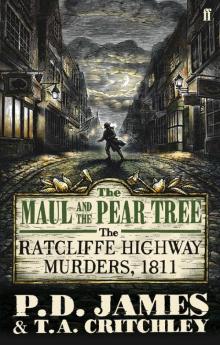 The Maul and the Pear Tree
The Maul and the Pear Tree